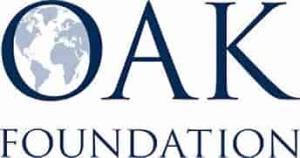
Director of Environment Programme/
Oak FoundationAbout Oak Foundation:
Through its grant-making, Oak Foundation supports others to make the world a safer, fairer, and more sustainable place to live. Oak Foundation has seven global programmes and four country programmes. The seven programmes are: Environment, Housing and Homelessness, International Human Rights, Issues Affecting Women, Prevent Child Sexual Abuse, Learning Differences and Special Interest. The four country programmes are located in Brazil, Denmark, India, and Zimbabwe. Oak Foundation makes grants to organisations in approximately 40 countries worldwide.
About the Environment Programme
The Environment Programme’s strategy focuses on three systems that present the greatest transformative opportunities: Energy, Natural, and Food. The Environment Programme adopted a strategy in 2021 that places people and communities at the heart of our work. People and communities, especially those who have been historically marginalised from decision-making, have the expertise, solutions, and power to inspire and foster lasting and durable environmental change. Through the power of people and communities, our partners have the tools to drive broad scale systems change and can help transform and restore our connection to nature, and change how we feed and fuel the world.
About the Wildlife Conservation and Trade sub-programme and purpose of the role
Wild places, such as savannas and forests, protect both the wildlife and human beings that call them home. Wild places drive the Earth’s systems of regeneration. Our work and grant-making focuses on the connectivity between people and their wild places. By supporting and lifting up the voice of communities, democratising access, increasing connectivity, and encouraging systemic thinking among ourselves, youth, Indigenous communities, women, and traditional leadership, we can find harmony in which all life, oceans, and wild places thrive. We support efforts that:
- Support the rich biodiversity of “living landscapes”. Living landscapes is the term we use to describe a conservation approach that supports productive, resilient rural networks of people who are able to deter over-exploitation, while safeguarding wildlife and wild places.
- Support local and regional projects that put people at the heart of conservation. This includes supporting women, youth, farmers, and herders, and other traditional leadership to: strengthen rural collectives and improve the distribution of benefits from natural wealth (e.g., nature-based tourism and sustainable harvesting of wild species); and connect networks that share socioecological and conservation aims, and promote new thinking among funders and decision-makers about conservation projects that do not isolate wildlife and wild places from the people who live in and around them.
- Build effective land and wildlife management programmes. This includes supporting individuals and collectives to create economic opportunities and align economic incentives that neither industrialise or overexploit the landscape, nor lead to the loss of social or natural value (e.g., the loss of Indigenous cultures, traditional knowledge and technologies, species, or rivers due to pollution).
- Disrupt and reduce the illegal wildlife trade globally. This includes establishing regional response networks with enhanced capabilities and better resilience to disruption.
The new head of sub-programme will be responsible for working with the lead Trustee and Director of the Environment Programme to initiate grant-making in Europe to promote sustained benefits for nature and people. We aspire to create a Europe that is richer in nature and more resilient to climate change, where wild spaces are recognised as fundamental parts of thriving societies. We aim to include policy-focused grant-making that promotes rewilding and better land management practices at both at EU and national levels. Ultimately, this new area of work will be the primary focus of this position, with supervisory responsibilities of our work in Africa and South East Asia.
Position requirements
The ideal candidate must have strong leadership skills, an entrepreneurial and collaborative spirit, and an interdisciplinary background in issues which include social sciences, conservation, natural resource management, law and policy, human rights, and accountability frameworks. The candidate will be managing a programme officer and may share supervision of support staff. The candidate will:
- Provide strategic direction to Oak’s Wildlife Conservation and Trade Sub-Programme, putting together the grant portfolio (individual grants and clusters), and review and comment on the team’s specific grant submissions
- Act as line manager for the Wildlife Conservation and Trade team, providing them with leadership, strategic direction, setting annual goals and assessing their performance
- Represent Oak Foundation at external meetings and contribute to internal and key constituent communications on the natural security system portfolio
- Maintain a strong network of relationships with key players in the conservation sector (not-for-profit organisations, scientific, philanthropic, government, private sector)
- Build donor collaboratives and alliances that support people-centred conservation approaches
- Develop a new area of grant-making supporting a Europe that is richer in nature, where wild spaces are recognised as fundamental parts of thriving societies
- Manage the day-to-day work of the staff, approving vacation and other absences, travel, and expenses incurred by team members, conducting performance appraisals
- Manage, with a high degree of latitude, the relationship with the Oak Trustee who leads the Wildlife Conservation and Trade Sub-Programme
- Working closely with the Programme Director to identify and develop strategic opportunities and ensure that emerging strategic issues are addressed in the context of the programme agenda
- Ensure the effective monitoring and evaluation of grants to ensure that Oak’s investments are most effective
- Identify high-impact, innovative, and entrepreneurial grant-making opportunities to further strengthen Oak’s leadership role across conservation philanthropy and in line with the strategic directions of the team
- Contribute to the people-centred strategic direction of the overall Environment Programme, with a special focus on shaping the community conservation components goals, including through the co-drafting of various submissions and reports to the Board
- Work with the Programme Director to ensure efficient progress in grant-making, monitoring, reporting and learning, as well as other administrative activities related to the programme
- Stay up-to-date on scientific, legislative, and regulatory developments within key regions where Oak has active grant-making
Our idea candidate will have:
- At least ten years’ relevant professional experience, and a track record of significant achievement in a discipline related to conservation, natural resource management, agricultural policy, and rights-based approaches
- A university degree in environmental, natural, or social sciences, political ecology, law, or public policy. A master’s degree demonstrating intellectual inquiry aligned with the programme goals is welcome
- Successful track record of leadership
- Strong personal and professional networks in conservation, natural resources, social movements, and civil society organisations
- An understanding of not-for-profit and/or governmental financial reporting and budgeting
- A proven research and analytical skills, with outstanding organisational abilities and a commitment to efficiency and meeting tight deadlines
- Excellent interpersonal skills
- A desire and ability to work in a collaborative team environment
- Excellent verbal and written communications skills, and comfort expressing opinions in a setting that encourages a vibrant exchange of ideas
- A strongly developed sense of integrity, humility, and discretion, and poise, maturity, and a good sense of humour
- Available for international travel, up to 50 days a year, sometimes for extended periods
- Excellent written and spoken English required
- A commitment to Oak’s organisational values
- A willingness to work out of the Oak Geneva office. Currently, we are all in the office three days, Tuesday, Wednesday, and Thursday, though this is subject to change
- An EU or Swiss citizen/valid work permit
